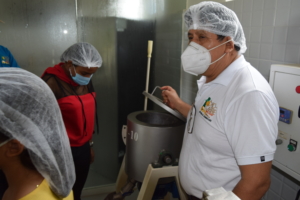Öko-Caribe’s Rise to the Top of Dominican Chocolate

Gualberto Acebey gives a tour of the Öko-Caribe facility during the Dominican National Chocolate Festival.
Gualberto Acebey is not your typical cocoa producer. Unlike many of his contemporaries, he is always taking risks and trying new things. At a young age, Acebey started making craft chocolate in San Francisco de Macorís, the cocoa capital of the Dominican Republic. Even then, he recognized the wide variety of flavors to explore with this single fruit.
Because of his own experience, Acebey developed an affinity for small cocoa producers and decided to focus his career on helping them. Dominican cocoa has grown a stellar international reputation in recent years, and Acebey founded Öko-Caribe to sell cocoa to international chocolate brands and ensure small producers receive their fair share.
Öko-Caribe has good quality control and was able to meet international standards to export cocoa beans. This is in part because Acebey had implemented a traceability system promoted and supported by the USDA-funded Exporting Quality program. Öko-Caribe also makes chocolate in the Dominican Republic through its brand, Öko-Choco. Acebey had the know-how and skills to produce fine chocolate, but the company needed more effective machinery to meet rising demand. With an equipment upgrade, he could cut processing time, buy more cocoa, and sell more chocolate.
Acebey was so keen on this idea that by the time he contacted Exporting Quality in 2018 he already knew exactly which roaster he needed, which suited the program’s in-kind grant mechanism. With applications accepted on a rolling basis, Exporting Quality relies on beneficiaries to define their equipment needs and works with them to make the upgrades. With the new roaster, Öko-Caribe was roasting 140 kilograms of cacao per hour, a 1000% increase in productivity. Öko-Caribe was able to increase sales and still maintain the quality of their locally sourced cocoa.
Prior to COVID-19, the Öko-Choco brand started to build a portfolio of commercial chocolate varieties, like those found at grocery stores in the Dominican Republic. The company was entering new markets and creating premium labels to compete with other local premium chocolate bars.
Öko-Caribe is not immune to the pandemic’s cooling effect on operations, but they had a strong showing at the first Dominican National Chocolate Festival and Awards in December 2020, an event coordinated by Exporting Quality. With a dedicated cacao processor like Acebey at the helm, the future of Öko-Caribe and small Dominican chocolate producers still looks sweet.
Exporting Quality Program in the Dominican Republic, funded by the United States Department of Agriculture ‘Food for Progress’ initiative and implemented by IESC, focuses its efforts on increasing productivity and sales for domestic and export markets of high-value fruit and vegetable global value chains: avocado, cocoa, pineapple, and greenhouse and Asian vegetables. The program also supports efforts to increase product quality, production efficiency, the value of post-harvest products, and to improve marketing and market linkages.


